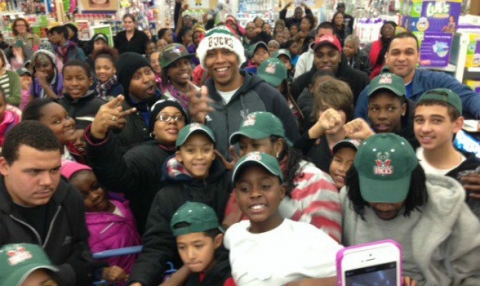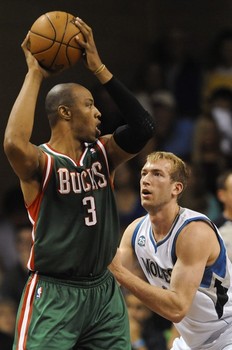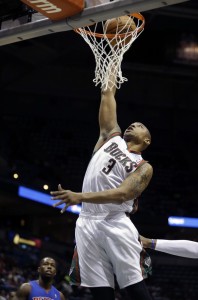- Contact
- Book
- 3D Foundation
- Butler Elite
- Staff
- 2018 17U
- - 2018 17U Photos
- - 2018 17U Videos
- 2019 16U
- - 2019 16U Photos
- - 2019 16U Videos
- 2020 15U
- - 2020 15U Photos
- - 2020 15U Videos
- 2021 14U
- - 2021 14U Photos
- - 2021 14U Videos
- 2022 13U
- - 2022 13U PHOTOS
- - 2022 13U VIDEOS
- 2023 12U
- - 2023 12U PHOTOS
- - 2023 12U VIDEOS
- 2024 11U
- - 2024 11U Photos
- - 2024 11U Videos
- 2025 10U
- - 2025 10U Photos
- - 2025 10U Videos
- Information
- Media
- Bio
Under The Tough Exterior of Tough Juice: The Evolution of the NBA’s Caron Butler

Mike Kasdan speaks with the NBA’s Caron Butler and learns that athletes can rise above and be role models.
The blunt punch line of that famous quote about athletes being role models is that they’re not: “I am not a role model.” NBA great, Charles Barkley, did get that right in one sense. Being a gifted athlete doesn’t necessarily mean you are of high character. One does not follow from the other.
But basketball—and sports in general—affords young athletes the opportunity to shape a better life for themselves, to rise out of poverty and rough neighborhoods. The ones who make it out and use the fame and success afforded by success in the game to come back to make sure things are better for the next kid, better for our community. They are role models.
The world of sports is filled with men behaving badly: superstar athletes who act above the law, whose off-the-field exploits overshadow their on- the-field careers. Extreme violence, rape, and bullying by pro athletes are all mass-media events.
There is far less press devoted to the athletes who overcome adversity and rise above off-the-field to serve their family and community. These stories live in the crevices of the NBA, the NFL, and other sports leagues. These stories are worth telling. And this is one of those stories.
There is far less press devoted to the athletes who overcome adversity and rise above off-the-field to serve their family and community. These stories live in the crevices of the NBA, the NFL, and other sports leagues.
These stories are worth telling. And this is one of those stories.
This past season, twelve-year NBA veteran Caron Butler returned home via a trade to the Milwaukee Bucks. With family and old friends in attendance, he was warmly welcomed in an emotional press conference at his old high school in Racine, Wisconsin. Butler stressed how excited he was to return home.
The Caron Butler who stood before them had grown up. And he wasn’t just a baller. He was a community advocate, focused on youth outreach, a proud father, and a dedicated husband.
The Caron Butler who stood before them had grown up. And he wasn’t just a baller. He was a man who was leaving a legacy, not just on the court but off it.
Throughout his career, Butler has been a community advocate, focused on youth outreach. He has tapped into his personal experiences to motivate kids to pursue their dreams. Butler explained, “A lot of guys that come from our neighborhood and walk of life, they try to get as far away from that environment as they can. They don’t come back to be pillars of the community. I always wanted to come back, to be approachable and be an example to kids in the community.”
Butler’s community and charitable work is rich and varied. He has visited incarcerated kids at the Oak Hill Youth Detention Center to share his life story and provide the kids with support and encouragement. He has helped organize community-wide dialogues about urban violence. He has sponsored community initiatives that encouraged strong relationships between youths and law enforcement officers. He has also spearheaded initiatives to get needy kids bikes, coats, and admission to summer basketball programs and clinics. As Butler explained, “All the programs we created focus on helping the community. Everything I have done helps address community problems- tackling obesity with bike giveaway, volunteering at center for battered women, or helping low income family to manage finances. All of these things affect the types of communities that I came from. That’s where I want be to – where I can have the type of impact that changes lives.”
Butler is now a proud father and dedicated husband. Caron has five children, four girls (Camary, Mia, Ava and Gia) and one boy (Caron, Jr.), ranging from 2 years old to 19. “I’ve got my hands full,” laughed Butler, “especially with all those girls.”
“Caron has gotten up and overcome adversity, not only to become a great basketball player, but become a great person.”
None of this came easy. Butler’s friend and former UConn teammate Kevin Ollie said of him:
“Caron has gotten up and overcome adversity, not only to become a great basketball player, but become a great person. When you go through certain things, it’s about how you give and how you step forward and how you grow. It’s not about what you do. It’s about who you are.”
It’s 2002, in Miami. Years before LeBron James took his talents to South Beach to join Dwyane Wade, the Heat were led by the slashing Eddie Jones and the rugged Brian Grant. The first round of the 2002 Draft brought instant help in the form of Caron Butler. Butler, a lottery pick out of Jim Calhoun’s legendary Big East powerhouse, University of Connecticut, was the quintessential small forward. Just as he had in his first year at UConn, Butler led the Heat in scoring during his first year there, averaging 15.5 ppg along with 5.1 rebounds.
Butler’s NBA success was no surprise to fans. His two-year college career at UConn was stellar. As a true freshman he led the team in scoring and rebounding. Over the summer, he had helped lead the United States to a gold medal in the FIBA World Championship for Young Men. And his star continued to rise in his sophomore year: he averaged 20.3 point and 7.5 rebounds a game, was named Co-Big East Player of the Year, and led UConn to an outright Big East Championship and to the Elite Eight in the NCAA Tournament.
 Butler is polished. A classy dresser and hard worker, he projects a calm demeanor and is a quiet leader. On his work ethic, Butler explained: “I don’t take anything for granted. I have been humbled before. When I was in the prime of my career – an All-Star scoing 20 points per night – I still did the same thing. Now, towards end of my career, I work the same way. These values were instilled in me since I was young. I don’t know any other way."
Butler is polished. A classy dresser and hard worker, he projects a calm demeanor and is a quiet leader. On his work ethic, Butler explained: “I don’t take anything for granted. I have been humbled before. When I was in the prime of my career – an All-Star scoing 20 points per night – I still did the same thing. Now, towards end of my career, I work the same way. These values were instilled in me since I was young. I don’t know any other way."
It may surprise some that Butler had come to UConn from a troubled background, growing up on the streets of Racine, Wisconsin. While he was a standout basketball player at Racine High School, getting out of Racine and playing professional basketball did not even seem within the realm of possibility, especially considering the propensity he had for running into trouble with the law: Butler was arrested 15 times before the age of 15.
A juvenile arrest record like that usually leads to a life of crime, or at least cuts off opportunities. But as the story goes, during this last arrest, Butler caught his mother’s eyes as he rode away in the back of the squad car. Seeing her pain, he knew that he had to change.
He rededicated himself to his craft, training mercilessly and studying intently. He also made a change, moving to Maine to attend Maine Central Institute. There, he continued to polish his game and put distance from the crimes and indiscretions of his youth, ultimately earning a scholarship to UConn.
Life as an NBA veteran can lead to frequent address changes. And in recent years, Caron Butler has moved around quite a bit. Though he started last season with the Bucks, by season’s end, he was moved to Oklahoma City. During the off-season, he signed with Detroit where he will play this year. “Its been an amazing journey. I played with some of the best players and been on some of the best teams during the prime of my career. I’ve traveled, seen the world and met a lot of great people. And I learned something everywhere I went. Now I’m excited about where I am – with young players – to be in the locker room, and take all experiences and give back.”
 In 2004, Butler left his first team, the Heat, along with Lamar Odom, Brian Grant, and two draft picks, in the blockbuster trade with the Lakers that brought Shaquille O’Neal to Miami. He continued his success with the Lakers, but was soon dealt to the Washington Wizards in a deal for former No. 1 overall pick, Kwame Brown. Along with Gilbert Arenas and Antawn Jamison, Butler formed the final piece of the Wizards high octane high scoring “Big 3.” In Washington D.C., Butler played the best ball of his NBA career, which included two All-Star appearances and several playoff performances. Cementing his reputation as the prototypical small forward, Butler had several seasons where he averaged 20 points per game, 6 rebounds per game, and 4 assists per game, a rare statistical feat in the history of the NBA.
In 2004, Butler left his first team, the Heat, along with Lamar Odom, Brian Grant, and two draft picks, in the blockbuster trade with the Lakers that brought Shaquille O’Neal to Miami. He continued his success with the Lakers, but was soon dealt to the Washington Wizards in a deal for former No. 1 overall pick, Kwame Brown. Along with Gilbert Arenas and Antawn Jamison, Butler formed the final piece of the Wizards high octane high scoring “Big 3.” In Washington D.C., Butler played the best ball of his NBA career, which included two All-Star appearances and several playoff performances. Cementing his reputation as the prototypical small forward, Butler had several seasons where he averaged 20 points per game, 6 rebounds per game, and 4 assists per game, a rare statistical feat in the history of the NBA.
Since then, after a number of injuries and his continued random involvement in blockbuster trades, Butler has bounced from the Wizards, to the Dallas Mavericks, and the LA Clippers, before returning back home to Wisconsin, and then on to Oklahoma City and then Detroit.
Having he chance to return to where it all started in Wisconsin was incredibly meaningful for Butler: “It felt great initially to come home and play for a team I rooted for as a child. To have the hometown crowd and YOUR fan base, people you grew up with support you on a night to night basis. Especially with us being at one of the bottom feeders of the NBA at the time, it hurt to leave. But I understand the business. Now coming back to the Midwest [in Detroit], I am close to my family, and I can get back to Racine to see my son Caron Jr. play high school basketball.”
Now a well-traveled veteran, he is a mentor to the younger players and still a capable high volume scorer. For Butler it has been a long trip. He has always shared off the court. He has always given back to strengthen the communities he has passed through, including his home town.
Caron Butler is quite a different man than the kid who left Racine many years ago. Not just an athlete who made it out, but a role model who came back.
